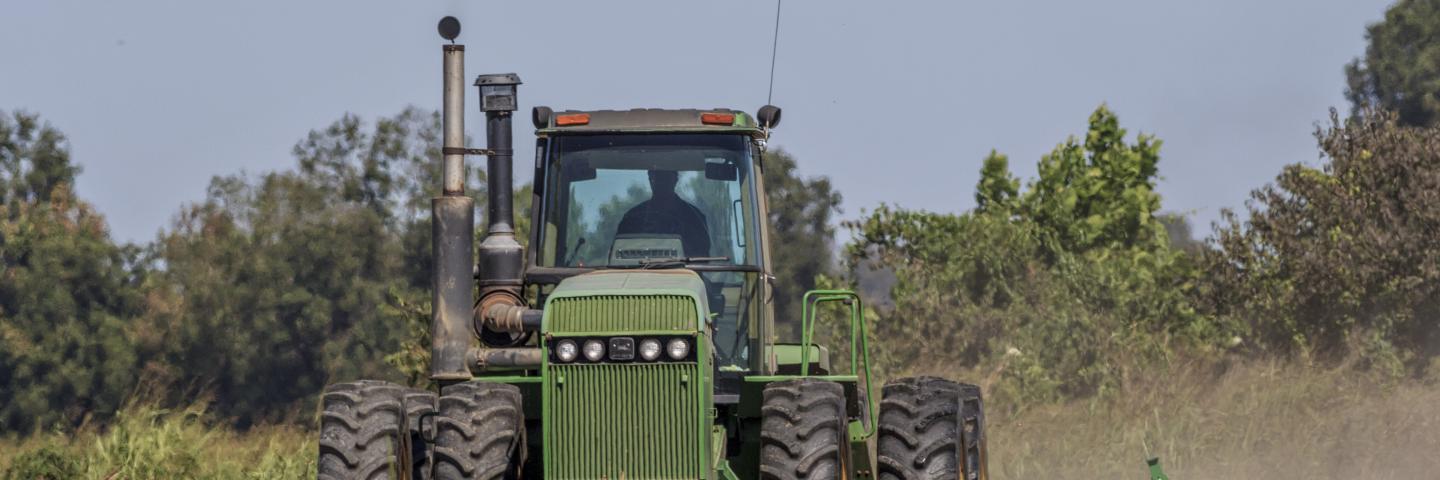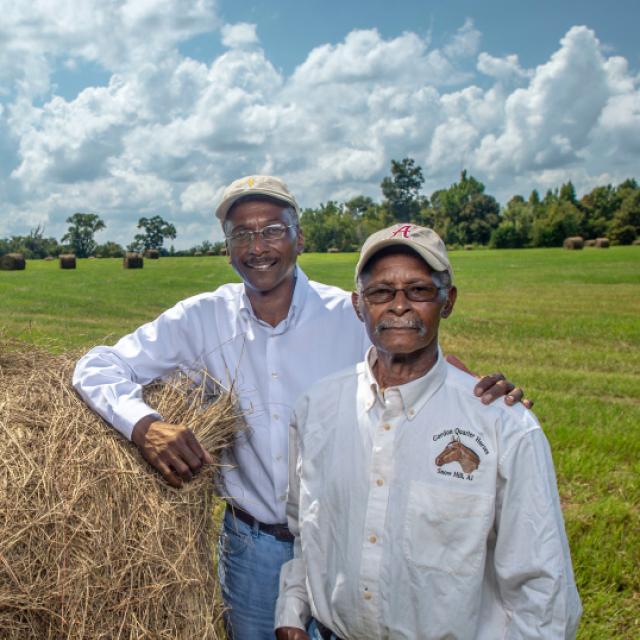
The Environmental Quality Incentives Program (EQIP) is NRCS’ flagship conservation program that helps farmers, ranchers and forest landowners integrate conservation into working lands.
How EQIP Works
Financial Assistance Payments Are Made On Completed Practices. Financial assistance payments through EQIP are made to eligible producers, to implement approved conservation practices on eligible land or to help producers develop Conservation Activity Plans (CAP) to address specific land use issues. Current Arkansas conservation practices.
Payments are made on completed practices or activities identified in an EQIP contract that meet NRCS standards. Payment rates are set each fiscal year and are attached to the EQIP contract when it is approved.
Historically Underserved Producers May Be Eligible For Higher Payment Rates
Historically underserved producers (limited resource farmers/ranchers, beginning farmers/ranchers, socially disadvantaged producers, Indian Tribes and veteran farmer or ranchers) who self-certify on Form NRCS-CPA-1200, Conservation Program Application are eligible for a higher practice payment rate to support implementation of contracted conservation practices and activities.
Historically underserved producers may also be issued advance payments up to 50 percent of the established payment rate to purchasing materials or contracting services to begin installation of approved conservation practices.
Self-certified socially disadvantaged farmer/rancher, beginning farmers/ranchers, and veteran farmer/rancher producers may elect to be evaluated in special EQIP funding pools. More information can be found on the State Programs website or from your local NRCS office.
For additional information about historically underserved producers categories, see the Socially Disadvantaged, Beginning, and Limited Resource Farmers/Ranchers, Veteran Farmers page.
Benefits
This voluntary conservation programs helps producers make conservation work for them. Together, NRCS and producers invest in solutions that conserve natural resources for the future while also improving agricultural operations.
Through EQIP, NRCS provides agricultural producers with financial resources and one-on-one help to plan and implement improvements, or what NRCS calls conservation practices. Using these practices can lead to cleaner water and air, healthier soil and better wildlife habitat, all while improving agricultural operations. Through EQIP, you can voluntarily implement conservation practices, and NRCS co-invests in these practices with you.
Program at a Glance
To get started, NRCS first works one-on-one with you to develop a conservation plan that meets your goals and vision for the land. This becomes a roadmap for which conservation practices best meet your needs.
Financial assistance covers part of the costs from implementing conservation practices. NRCS offers about 200 practices depending on where your land is located. These practices are geared towards working farms, ranches and forests and provide producers with many options for conservation. See a list of practices.
Apply Now
Farmers and landowners in Arkansas have until November 22, 2024, to submit applications to receive financial assistance to implement conservation activities through the Environmental Quality Incentives Program (EQIP) for the 2025 program year. Applicants can sign up at their local USDA Natural Resources Conservation Service (NRCS) Field Service Center https://www.nrcs.usda.gov/contact/find-a-service-center.
Assistance is available to help farmers and landowners plan and implement conservation practices to improve water quality, build healthier soil, improve grazing and forest lands, conserve energy, enhance organic operations, establish or improve wildlife habitat and achieve other environmental benefits on the landscape. NRCS accepts program applications continuously. However, to be considered for funding during this signup applications must be received by Nov. 22, 2024. Applications received after this date will be considered in later funding periods, subject to funding availability.
EQIP contracts provide financial assistance to help plan and implement conservation practices to improve soil health, water quality, improve grazing and forest lands, and establish or improve wildlife habitat. EQIP can also assist Arkansas producers meet Federal, State, and local environmental regulations.
Additionally, NRCS offers special initiatives, including:
Organic Initiative - helps producers install conservation practices on certified organic operations or those working toward organic certification.
- On-Farm Energy Initiative - helps producers conserve energy on their operations.
- EQIP Conservation Incentive Contracts (CIC) https://www.nrcs.usda.gov/eqip-conservation-incentive-contracts - provides financial assistance to address priority resource concerns, including sequestering carbon and improving soil health in high-priority areas. Through these contracts, NRCS works with producers to strengthen the quality and condition of natural resources on their operations using management practices that target resource concerns including degraded soil condition and soil erosion. The focus within Arkansas for CIC is to increase the adoption Prescribed Grazing and improving grazing systems on Pasture and Grazing lands. Conservation Incentive Contracts last five years.
- Strikeforce – additional assistance for underserved producers in 48 persistent poverty counties: Arkansas, Bradley, Chicot, Clark, Colombia, Dallas, Desha, Drew, Hempstead, Howard, Jackson, Lafayette, Lawrence, Lee, Mississippi, Monroe, Nevada, Newton, Ouachita, Phillips, Randolph, Searcy, Sevier, St. Francis, Woodruff, Ashley, Clay, Conway, Craighead, Crittenden, Franklin, Fulton, Independence, Izard, Jefferson, Johnson, Lincoln, Madison, Miller, Montgomery, Poinsett, Polk, Scott, Sebastian, Sharp, Stone, Union, and Van Buren.
- Strikeforce Healthy Forest (Keeping It In the Family) Initiative – additional assistance for underserved producers to improve forestlands with forestry conservation practices in 18 counties: Bradley, Calhoun, Clark, Cleveland, Columbia, Dallas, Drew, Hempstead, Howard, Jefferson, Lafayette, Little River, Miller, Nevada, Ouachita, Pike, Sevier, Union.
- Working Lands for Wildlife Northern Bobwhite Quail Initiative - provides financial and technical assistance to producers to enhance early successional habitat to aid in bobwhite quail recovery.
- Migratory Bird Resurgence Initiative (MBRI) - provides financial assistance to Arkansas producers for migratory bird and waterfowl habitat.
- High Tunnel Initiative - High tunnels protect plants from severe weather and allow farmers to extend their growing seasons – growing earlier into the spring, later into the fall, and sometimes, year-round.
- Urban Ag/Small Scale Initiative - For urban operations in this particular sign-up, NRCS offers technical and financial assistance with conservation practices, such as conservation cover; conservation crop rotation; cover crops; high tunnel systems; irrigation system, micro irrigation; Irrigation Water Management; low tunnel systems; Mulching; Nutrient management; Pest management conservation system; Prescribed grazing; Raised beds; Residue and tillage management – no-till; Residue and tillage management – reduced till; Roof Runoff Structure; Soil carbon amendment; and Wildlife habitat planting.
- Arkansas Groundwater Initiative (AGWI) - targeted approach to address critical groundwater decline issues in the Arkansas Delta, providing assistance to agricultural producers in eight counties: Arkansas, Prairie; and portions of Craighead, Cross, Lonoke, Monroe, Poinsett, St. Francis.
- National Water Quality Initiative (NWQI) Existing Projects – provides financial and technical assistance to improve water quality and aquatic habitats in priority watersheds with impaired streams. Projects include: Saline Headwaters – portions of Howard, Pike, and Polk counties, Upper Village Creek – portions of Lawrence and Randolph counties, Lower Little Red River – portions of White County, Bayou Bartholomew – portions of Drew and Chicot counties
- Mississippi River Basin Initiative (MRBI) Existing Projects – provides assistance to improve water quality in the following project areas: Candy Creek – portions of St. Francis and Lee counties, Twin Creeks – portions of Cross, Woodruff, St. Francis counties, Izard Lower Strawberry – portions of Izard and Sharp counties, Canal 43 – portions of Desha, Drew, Chicot counties, County Line Strawberry – portions of Sharp and Lawrence counties, Flat Hills – portions of Poinsett and Cross counties, Glade-Raft-White Oak Creek – portions of White and Prairie counties, Lee County – portions of Lee, St Francis, and Phillips counties, Lower White-Bayou Des Arc – portions of Prairie county, West Craighead – portions of Lawrence, Greene, Craighead, and Jackson counties, Arkansas County Lower White – portion of Arkansas county, North Big Creek-Strawberry River – portions of Sharp and Izard counties, Honey Cypress-Buffalo Creek – portions of Craighead and Mississippi counties, Lower Strawberry – Izard, Sharp, and Independence counties
All applications will be evaluated for funding based on local, state and nationally developed criteria to optimize environmental benefits. Applications ranking highest in a funding category will be funded according to priority and is subject to availability of program funds.
For more information, visit http://www.ar.nrcs.usda.gov/ or contact your local USDA/NRCS Field Service Center https://offices.sc.egov.usda.gov/locator/app.
Additional Information
Apply for Environmental Quality Incentives Program (EQIP)
The Environmental Quality Incentives Program (EQIP) provides financial and technical assistance to agricultural producers and non-industrial forest managers.
Learn MoreHistorically Underserved Farmers and Ranchers
The Agriculture Improvement Act of 2018 (2018 Farm Bill) includes provisions that address socially disadvantaged, beginning, limited resource, and veteran farmers and ranchers (“historically underserved producers”).
Learn MoreFarm Bill
The 2018 Farm Bill was enacted on December 20, 2018. The Farm Bill continues its strong support for conservation efforts of America’s farmers and ranchers through reauthorization and expanded flexibility of NRCS conservation programs.
Learn MoreReady to get started?
Contact your local service center to start your application.
How to Get Assistance
Do you farm or ranch and want to make improvements to the land that you own or lease?
Natural Resources Conservation Service offers technical and financial assistance to help farmers, ranchers and forest landowners.

To get started with NRCS, we recommend you stop by your local NRCS field office. We’ll discuss your vision for your land.
NRCS provides landowners with free technical assistance, or advice, for their land. Common technical assistance includes: resource assessment, practice design and resource monitoring. Your conservation planner will help you determine if financial assistance is right for you.
We’ll walk you through the application process. To get started on applying for financial assistance, we’ll work with you:
- To fill out an AD 1026, which ensures a conservation plan is in place before lands with highly erodible soils are farmed. It also ensures that identified wetland areas are protected.
- To meet other eligibility certifications.
Once complete, we’ll work with you on the application, or CPA 1200.
Applications for most programs are accepted on a continuous basis, but they’re considered for funding in different ranking periods. Be sure to ask your local NRCS district conservationist about the deadline for the ranking period to ensure you turn in your application in time.
As part of the application process, we’ll check to see if you are eligible. To do this, you’ll need to bring:
- An official tax ID (Social Security number or an employer ID)
- A property deed or lease agreement to show you have control of the property; and
- A farm number.
If you don’t have a farm number, you can get one from USDA’s Farm Service Agency. Typically, the local FSA office is located in the same building as the local NRCS office. You only need a farm number if you’re interested in financial assistance.
NRCS will take a look at the applications and rank them according to local resource concerns, the amount of conservation benefits the work will provide and the needs of applicants. View Application Ranking Dates by State.
If you’re selected, you can choose whether to sign the contract for the work to be done.
Once you sign the contract, you’ll be provided standards and specifications for completing the practice or practices, and then you will have a specified amount of time to implement. Once the work is implemented and inspected, you’ll be paid the rate of compensation for the work if it meets NRCS standards and specifications.

